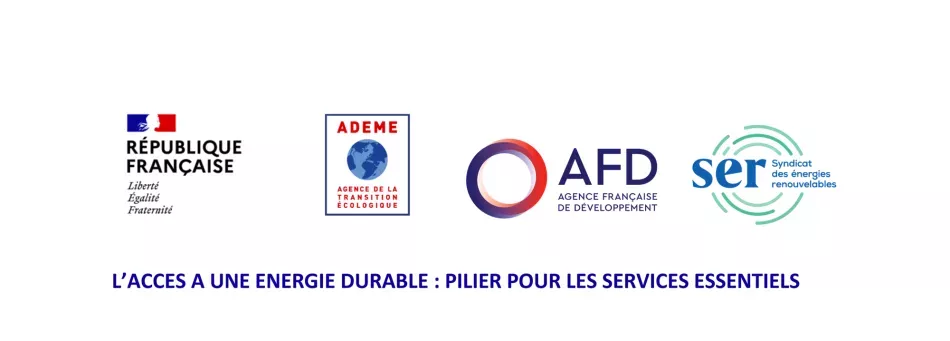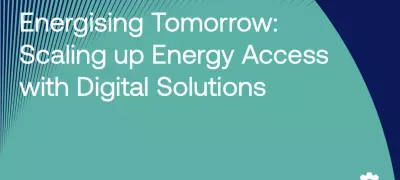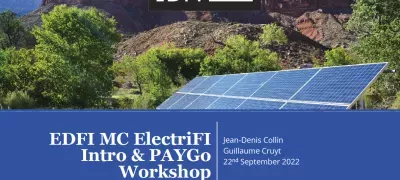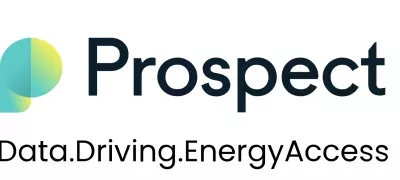
The aim of the conference, organized by ADEME, AFD and SER on May 10, 2022, was to present the work of the working group (WG) and identify priorities for accelerating the achievement of energy access targets. Held in a hybrid format, the event brought together over 90 face-to-face participants in Paris, and enabled remote participants to connect via the Imagina application. Hosted by Philippe Legueltel from the Aprim agency, the day was an opportunity to share the key lessons learned from the capitalization exercises.
One of the major issues addressed at the conference was the question of sovereignty in terms of energy production, particularly in sub-Saharan Africa and South-East Asia, where almost 800 million people have no access to electricity. To meet these challenges, it is estimated that an annual investment of around $35 billion will be required. In France, both NGOs and companies have developed expertise in supporting access to energy, offering various solutions such as grid extension, solar kits and mini-grids.
Discussions also highlighted the importance of public policy, pricing and capacity-building in fostering the emergence of energy access projects. Innovation, planning and end-of-life management were identified as crucial aspects to be taken into account in this field.
Global Report Doc (FRENCH)
Round table 1: Public policy and the regulatory framework, the genesis of national energy access strategies
- David LECOQUE, Managing Director, Alliance for Rural Electrification (ARE)
ARE federates over 200 structures active in rural electrification, using decentralized renewable energies. One of ARE's objectives is to work on improving regulatory frameworks.
The Guide pour l'élaboration d'un cadre réglementaire favorable aux mini-réseaux à base d'énergie renouvelable, produced by a consortium of players including ARE, is a response to the need to integrate mini-grids into national electrification and rural development strategies. The main problem identified is that investment is not keeping pace with objectives.
The priority is to move forward more quickly and ensure that the work carried out is implemented in the field.
Download the presentation (FRENCH)
Restitution of the capitalization of ADEME's 1st call for projects of 2017 on innovative solutions for off-grid energy access.
In 2017, ADEME in partnership with the French Ministry of Ecological Transition launched a first call for projects on innovative solutions for off-grid energy access projects. 9 winning projects implemented in Africa were selected, the outlines of which are presented in the presentation medium. As the capitalization exercise is not yet complete, these are just a few initial lessons to be learned, with the final results to be published in September.
- Maxime Guillaud, Founder & CEO, INSKIP
- Stéphane Baudé, Project Director, Nomadéis
- Hugo Bacry, Nomadéis
6 key success factors were identified through this capitalization:
1) Legal and regulatory support: difficulties in communicating with local and national authorities were noted, sometimes leading to refusals to obtain permits.
2) Administrative and institutional facilitation: networking with institutions helps to unblock authorizations.
3) Adapting to local conditions: some projects have encountered difficulties in gaining local acceptance. The key success factor is to have teams that are well-informed and rooted in local practices, and to provide well-structured road maps.
4) Approach to the local network and stakeholders: an essential factor in the success of projects is to have local relays, as close as possible to customers. These partners must be identified as early as possible in the life of the project, and it is essential to include them in decision-making bodies.
5) The composition of the project teams.
6) Financial forecasts and anticipation of the transition to scale make it possible to build financing plans for the various stages of the project and thus anticipate expenditure.
The proposed analysis grid has been used to evaluate the project since it began in 2017. This analysis grid is based on various criteria:
- Innovation;
- Adaptation to local realities, local anchoring, replicability, change of scale and added value of the project;
- Team implementation capacity.
Capitalisation presentation support (FRENCH)
Presentation of 4 winning projects:
The Biocombustible Typha Industriel (BTI) project involves setting up a pilot industrial production line for biomass energy from typha in Mauritania. GRET, which is carrying out the project, aims to facilitate access to a more environmentally-friendly cooking energy source that will enable the region's economic development.
In its pilot phase, the project aims to produce 1,000 tons of biofuel per year, and has raised the TRL (Technology Readiness Level) from 5 to 7.
GRET became aware of the need for regular dialogue with national and local institutions on the context of implementation in particular. They were faced with differences in pace between the executive committee and the partners, which were alleviated thanks to the regular meetings organized. Improved dialogue with local institutions has led to a real awareness at national level of the importance of valorizing Typha.
Benoo's EMPER project offers a system of kiosks deployed to electrify villages in isolated areas. These kiosks have been configured for different uses. What's interesting about this project, which has been deployed in 5 localities, is that the local ecosystem has been highly relevant, and the partnership approach with local people and the digital component have worked rather well. Local ownership and, in particular, the involvement of women were decisive factors.
PAMIGA offers a solar panel solution equipped with PAYGO technology, creating a partnership between microfinance institutions and installers. More than 3,600 solar products have been installed, over a hundred agencies trained in the field and around 80 contractors trained to install these products. 2 main difficulties encountered:
- Technical difficulties integrating financial payment;
- Regulatory: new regulations put a brake on the project.
Zembo leases solar-powered electric motorcycles. A fleet of 200 electric scooters, 400 batteries and 27 operational recharging stations have been set up. Zembo estimated that drivers saved $10 a week compared with combustion engine solutions.
They had to set up a maintenance system by implementing a predictive solution to prevent breakdowns, and technical solutions to adapt electric 2-wheelers to the realities of the African climate. Finally, institutional support was essential. The solution enjoys a good reputation in Uganda, and is now ready to be deployed on more than 2,000 motorcycles.
Feedback from private operators and NGOs
- Jérôme Gastaud, Climate and Energy Project Manager, FFEM
- Emeline Moreau, SEREN Department Support Officer, GRET
- Géraldine BRUGGEMAN PALLIERE, Energy Project Manager, IED
- Iris NICOMEDI, International Project Manager, ADEME
- Nicolas SAINCY, Co-founder Nanoé Madagascar
- Alexis CAUJOLLE, Program Manager - Energy Access, GERES
AFD, FFEM and ADEME wanted to learn from recent experiences with mini-grids, with a view to making their approach to the sector more efficient. Three NGOs (GRET, GERES and FONDEM) and three private players (SAGEMCOM, NANOE and IED) were therefore invited to share and cross-fertilize their experiences with mini-grid electrification projects, with a view to enhancing best practices and catalyzing possible synergies between NGOs and private players.
Capitalization work focused in particular on project operating methods and the timeframe for their preparation and implementation, as well as on the roles of public institutions and donors. Lessons were learned on best practices for acting in sometimes rigid or unfinished regulatory contexts, and on the need to support local capacity-building, both for local infrastructure operators and for users and the local economic ecosystem.
Anticipation, flexibility and in-depth dialogue at local level were seen as the keys to successful project development. Supporting the financing of productive and user equipment is now recognized as a necessity to ensure and maximize the impact of electrification projects.
Stimulating the local entrepreneurial pool and providing training, particularly for young people, are essential to local economic development and the long-term viability of electrification infrastructures. What's more, the ambition to change scale in terms of geographical coverage and impact requires the creation of long-term partnerships with local players capable of supporting this ambition and accompanying its implementation.
The combination of these approaches - anticipation, flexibility, dialogue, stimulation, user support - contributes to the economic viability of operators and the sustainability of infrastructures.
Lastly, greater flexibility and openness in project selection procedures by funding bodies, and encouragement to seek synergies between stakeholders, would help to foster innovation in methods and in the technical options available to beneficiaries.
The products of this capitalization (experience and recommendation sheets, interview videos, verbatim reports from field players) are available online on the MIRO didactic and interactive platform. (French contents)
Download the presentation (FRENCH)
Capitalization and feedback workshop: ways of linking access to energy and productive uses to promote local economic development
- Workshop moderator: Clément LUGAGNE, Project Manager - International Climate-Energy Cooperation Network, co-pilot of SGT3 of the National WG on energy access
This workshop is the 5th and last to be held as part of SGT3 Capitalization and Feedback of the 2nd phase of the work of the National WG on energy access, co-piloted by ADEME and SER.
Access to energy is not an end in itself, and over and above domestic uses, it is essential that it be a lever for local economic development. Productive uses can generate income, create anchor consumers, kick-start the economic development process and strengthen operators' business models.
- Madeleine FAUCHIER, Development Manager, FONDEM
The PAMELA methodology was carried out between 2016 and 2020 in collaboration with the Pacte laboratory at Grenoble University, a number of local and non-local partners and associations, as well as AERs in Madagascar and Senegal.
The PAMELA methodology consists in highlighting a 5-step process to ensure the emergence of income-generating activities (IGAs) and strengthen local electricity operators. It is designed to be adaptable to different contexts, and was developed on the basis of the following observations:
1) The arrival of electricity in a village is not necessarily followed by economic development, as there are barriers to entrepreneurship and more structural issues such as women's entrepreneurship or access to credit.
2) Domestic use of electricity is not sufficient to support a business plan for an electricity operator to achieve sustainability of the electricity service.
The 5 steps of the methodology are as follows:
1) Study of the socio-economic context and study of the electrical system;
2) Raising awareness of productive uses and first wave of calls for projects and contractors;
3) Official selection of project leaders in 2 stages, enabling training needs to be redirected and selected;
4) Installation of equipment and recovery of the co-financing portion;
5) Support and follow-up over time.
Feedback and outlook :
1) The need for training is very great;
2) There are many questions about the savings and debt capacities of the entrepreneurs selected.
3) Specific support for women entrepreneurs is needed to help them identify productive uses and gain access to credit;
4) It is important to work on technological innovation, particularly for bill collection, by considering prepayment solutions;
5) It's a good idea to set up emergency funds that have not yet been earmarked at the time of the project.
Download the presentation (FRENCH)
- Michel TRANIER, Café Lumière Project Manager, ESF
Café Lumière is a project in Madagascar financed mainly by the AFD in the highlands, which means that the climate has its own specificities. ESF has deliberately chosen small villages that are not easy to develop, and has built installations according to budget and needs.
6 villages have been equipped with a service platform consisting of a photovoltaic micro-station with storage and a backup with a generator. ESF's aim is to ensure that as many people as possible benefit from electrical energy and services via solar lamps, SHS, telephone recharging, etc. The platform also powers public services: schools, health centers, town halls, etc.
The villages are located in rice-growing areas, with rice being the main staple. The only use of fossil fuels in these villages is for rice hulling, so diesel engines have been replaced by relatively low-cost electric hullers. Other productive uses are as follows:
1) Conventional or battery-powered hand-held power tools;
2) Welding machines;
3) Refrigeration.
Finally, the key success and sustainability factors identified are:
1) Properly design installations (power, budget and requirements);
2) Identify and support IGAs made possible by electrical energy in other sectors (health, agriculture, access to water, handicrafts and Internet access);
3) Solicit financing via microfinance institutions (MFIs).
4) Ensure that skills are transferred to villages and users are trained by project partners based in the country.
Download the presentation (FRENCH)
- Eric EUSTACHE, Head of the Agro-entrepreneurship cluster - Entrepreneurs du Monde
Entrepreneurs du Monde is an NGO working in 4 areas:
1) Microfinance
2) Access to energy
3) Support and creation of very small enterprises (VSEs)
4) Agro-entrepreneurship
The association creates social enterprises on a project basis: identifying a problem and providing a solution based on an activity with an economic model to ensure sustainability over time.
The conservation of agricultural produce in the Sahel is the problem chosen by Entrepreneurs du Monde. It is one that has long been familiar to development players. How can relatively fragile agricultural products be preserved at controlled temperatures? It is estimated that 20% of cereal production (which represents 48 million people to feed) in Sub-Saharan Africa is lost every year, representing an annual loss of around 4 billion dollars. For fruit and vegetables, losses range from 30% to 60%. The limiting factor in these problems is access to energy to produce cold.
The approach adopted was therefore to identify the temperature at which products could be preserved, and to combine low-tech means, easy technologies and a little high-tech to obtain solutions that would enable the objectives set to be achieved.
The chosen model: a building constructed by local workers with double earth insulation to reduce heating, and wind walls to ensure the evacuation of humid air. Photovoltaic energy is used to produce cooling using small air-conditioning units, while fans are used to extract humid air. This 12kW installation keeps the inside temperature at 25 degrees, thus delaying the release of the products stored there.
The aim is to construct a large number of buildings and operate them via a social enterprise, a storage company whose job will be to handle entry and exit operations, building maintenance and so on.
Download the presentation (FRENCH)
- Christian CESBRON, International Development and Industry Manager, Freecold
Freecold develops innovative solar-powered refrigeration solutions. With a wide range of products, from household refrigerators and freezers to cold rooms, small mobile refrigerators for out-of-home sales and refrigerated storage tank systems.
40% to 50% of produce in Africa is lost just after harvest, and the World Food Programme estimates that 20 million tonnes are lost just after harvest in sub-Saharan Africa. Beyond the product not consumed, we need to consider the entire production chain mobilized for these lost products. In market-garden or livestock production zones, there is barely 20% electrification, so we have to rely on mini-network or autonomous cold room solutions.
Refrigeration is the only technology that can preserve perishable goods. The solutions developed by Freecold help to reduce post-harvest losses, boost the incomes of farmers and breeders, and increase food security. The obstacle to implementing these solutions is that market-gardeners have little or no access to financing: 80% of small businesses have no access to credit, whereas a cold room, which is an income-generating tool that prevents losses, can be repaid in a year or two at most.



